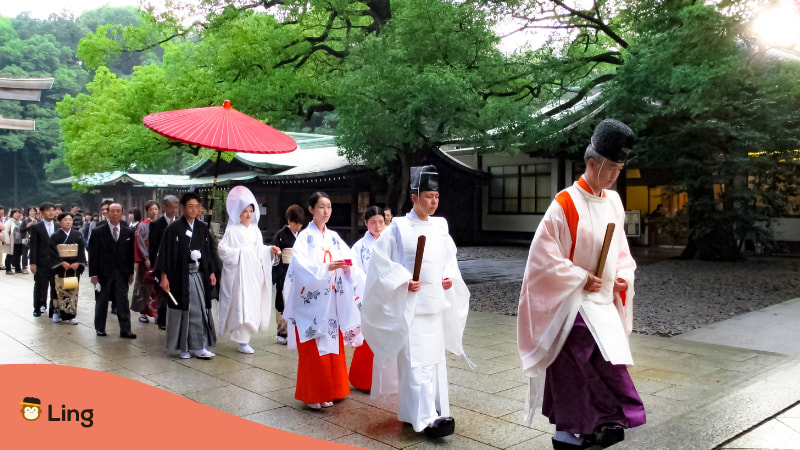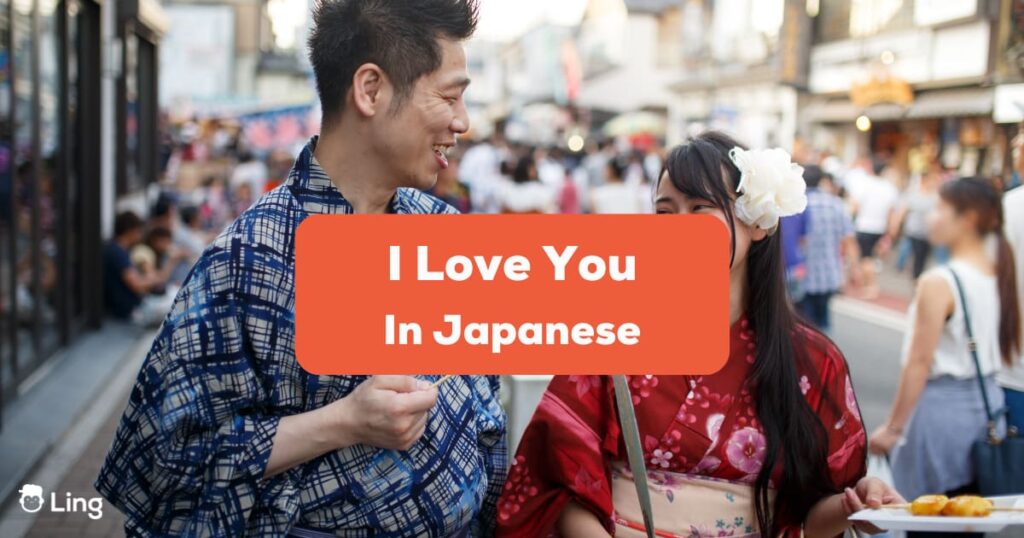Declaring love by saying I love you in Japanese is not common among the locals even if they have been together for quite a time. In fact, they do not take the word lightly, and most people in a serious relationship mainly demonstrate their love through actions instead of verbalizing it.
In this post, we will walk you through some of the most common ways to say I love you in the Japanese language, as well as the usual romantic phrases you can use with your special someone. If you are up for that, then let’s start learning!
The 3 Best Ways To Say I Love You In Japanese According To The Locals
- Aishiteru (愛してる) – I love you
- Daisuki (大好き) – I really like you
- Suki (好き) – I like you
From what we learned above, there are different ways to express “I love you” in Japanese. However, when we asked the locals, they said that these three ways are more popular with them and are guaranteed to make someone fall deeper for you!

1. I Love You – Aishiteru (愛してる)
The Japanese ai shiteru (pronounced as aye-shee-teh-ru) expression is translated as I love you in Japanese. It makes use of the kanji 愛 (ai) which refers to a romantic type of love.
In English, a close translation to this phrase would be “I love you so deeply.” Native speakers have cautioned me only to use this when I am 100% sure of my feelings.
Perhaps, you can learn how to say this before your kokuhaku (告白) or confession of love!
Tip: If you want to make it sound like a casual expression, you can express it by saying ai shiteru yo (愛してるよ). Adding “yo” makes it casual.
So, Is It Weird To Say Aishiteru (愛してる) In Japan?
Due to cultural differences, you might be surprised to know that not all Japanese actually blurt out these three special words most of the time. In fact, some of the married locals stated that they said it very rarely to their partners!
For this reason, saying I love you in Japan is not viewed as weird, but it is definitely a big deal in the country. For most men, they hesitate to say this because of the following reasons:
- These words should not be used lightly
- These should only be said in private
- Professing love can be done through actions
- Some are shy to admit and say out loud their feelings
2. I really Like You – Daisuki (大好き)
This is the most literal way to say that you really like someone. This phrase is a whole lot stronger than merely saying suki. Fortunately, this is easy to use as it can be general. For instance, you can use it to express affection or how much you like a person, thing, place, activities, etc.
Tip: If you cannot remember the difference between suki and daisuki, just memorize the first character which is 大 (dai). This character means “big” so if you have a really big love for someone, add the character dai before the suki.
3. I Like You – Suki (好き)
Suki (also known as suki desu 好きです in formal situations) is one of the widely known translations for saying “I like you.” While it does not mean “love” per se, this can be used to show your interest to date someone.
According to the locals, this is usually heard during confessions after a series of dates. With this said, do not say this phrase right away after just meeting someone or you might scare them away!
More Ways To Say I Love You In Japanese
There are not limited to only 3 phrases above to say I love you in Japanese. Whether you have a special someone in Japan or are merely trying to expand your vocabulary, learning how to express love and sincere affection in the most natural ways in Japanese culture can significantly help you out. But before we give you the translations, let us first walk you through some cultural norms.
- In Japan, “love” is a word that is only reserved for couples or for your long-time partner. It is not common to hear the locals say “I love you” to their friends, pets, or family members.
- Due to the influence of the Westerners on Japan, the younger Japanese people are now starting to say I love you more often, but they mainly use the casual form instead of the masu (ます)form.
- Whether you are just on a date or already a couple, a Japanese partner will always have the acts of service or gifting as a love language.
- If ever you say I love you in Japanese but do not get any response, please do not be offended since it is truly not natural for them to say it back right away.
- The word love can be translated into two words, and these are 愛 (ai) or 恋 (koi). Ai refers to romantic love, while Koi describes the feeling of being in love.
- The best time for a confession or 告白 (kokuhaku) is after the third official date with your special someone.
- The verb “to love” is translated as 愛する (aisuru) and is used to express your affection in a number of ways. You can say 愛してるぜ (aishiteru ze) if you are a man or 愛してるよ (aishiteru yo) for a woman.
- When chatting online, you might see Japanese people saying dokidoki (ドキドキ), and this translates to the sound of a fast-beating heart.
Now that we know the basics let’s discuss the 10 expressions you must master to say I love you like a native. For the expressions below, please note that most of these are casual, but if you want it to sound formal/polite, you can simply add the word desu or です. For instance, we can say suki desu or daisuki desu.
Expressing Love In Japanese Through Terms Of Endearment
Now that we know what each of those lovely phrases literally means in English, allow us to walk you through some of the common terms of endearment used by the locals to call their special person.
Dating Culture In Japan
No matter where you are in the world, we cannot deny that every country has its own beliefs and traditions when it comes to dating. Some are more conservative than others while there are also countries where the people can freely act (respectfully speaking) on their desires to someone they really like. Even if you are not Japanese, there shouldn’t be a hindrance if you truly want to court someone from Japan! All that you should be aware of is the dos and don’ts so that you won’t get yourself in trouble.
Similar to the existing dating traditions in the Philippines and the dating culture in Thailand, the concept of dating is rendered as conservative. In fact, they are indirect and subtle. More often than not, the locals do not rush into it to test whether their emotion is real and valid or just a passing one. After some interviews with the locals, we even found out that those interested to couple up do not really go on dates on their own, especially for the first time! Instead, they do gōkon (合コン) or group dates!
Let’s learn more about the ways to find love and get a date in Japan below!

How Do You Meet And Find Love In Japan?
Love in Japanese is a tricky thing. Unlike in other Asian countries, popular dating sites among foreigners like OkCupid, Grindr, Hinge, or Tinder have not really taken off among the locals.
For adults, many can attest to the fact that it is better to meet your better half from your school, work, location, or through mutual friends. For this reason, it is quite rare to hear stories where adults can say that they met online. The only exception to this, of course, is the younger generation.
Many of the young ones out there often use dating apps and social media to meet new people. However, the number of those interested in getting into a relationship at a young age is declining as many are more interested in their career and school work.
But if you are already at an age wherein you are financially stable and willing to settle down, the best way to meet and find love in Japan is through omiai (お見合い) or arranged dates.

Arranged Dates – Omiai (お見合い)
Omiai also referred to as miai, is a traditional Japanese custom of matchmaking with the intention of marriage. It is somewhat similar to that of the Chinese matchmaking culture in which the parents will choose and introduce their sons or daughters to another family.
Do note though that this is not the same with an arranged marriage, as the men and women here are free to decide if they want to continue the meeting into a courtship. It is also important to keep in mind that all communications after the date during this type of custom are only between the parents of both parties.
Historically speaking, omiai has been around since the 16th century as many of the locals are usually marrying only within or above their social classes.
The union is often done to fortify alliances and strengthen bloodlines between families which is why dating used to be viewed as a family event before. To this day, modern families may still sign up young adults to join matchmaking agencies.
A Group Blind Date – Gōkon (合コン)
The Japanese word gōkon 合コン (sometimes written as goukon) is actually a combination of the words “goudou (合同)” and “konpa (コンパ)” which refers to a group blind date. There are usually two forms of group dates in Japan and that could either be a blind date (with the same number of male and female participants) or a friends date (organized by people who already know each other).
You can easily join one by asking around online or spotting flyers as you walk the streets of Japan. During my stay in the country, I actually saw a lot of posters even at train stations!
The concept of gōkon is interpreted as a traditional way of helping adults gauge the mutual interest and suitability of individuals. While some of those who go on this type of data does not come out with a partner, it is a great way to blend in with the locals and meet new friends.
Even if you are a foreigner, you might be surprised by how open some of the locals will invite you to such events.
For them, going on a gōkon instead of a 1-on-1 date lessens the pressure for both males and females. This way, they do not have to worry about expenses and what to do during the intimate day.
This makes it perfect if you are on a budget or have a shy personality. Also, if you have ever been to the country, you will understand how expensive it may be to treat someone out on a date since everything is not really budget-friendly per se.
Unlike in other countries, gōkon is not done in informal bars or izakaya (居酒屋). Instead, the location is usually in restaurants with private rooms to avoid awkwardness. If you join one, remember that some of these arranged dates are good while others may seem like a total disappointment.
As with everything else, it is a mixed bag! If you ever feel uncomfortable with your assigned date or the location where it will be held, don’t hesitate to leave the place.

Marriage Hunting Party – Kekkon Katsudou (結婚活動) Or Konkatsu (婚活)
Did you know that in 2020, about 16.5% of marriages in Japan were actually born out of konkatsu? Often known as a “marriage hunting” party, katsudou or konkatsu is viewed as one of the best ways to find dates and get married in Japan.
Unlike in the concept of omiai, the men and women can communicate with each other before and after the date and actually express whether they want to continue the courtship or not. It gives more freedom and time than arranged marriages too.
Instead of just having the date in a 5-star restaurant, the couple could go around and enjoy the beach, play some sports, and do whatever activity they would like without any judgments from society. However, if they do decide to sign up for matchmaking agencies, the location and activities allowed might differ.
On top of that, the qualifications to get a match in these agencies can be pretty high so be sure also to set your expectations. At the end of the day, the participants here are expected to be mature and should have 100% intentions of marrying.
How To Say Will You Marry Me In Japanese
Did you know that many Japanese people do not use universal Western lines like “please marry me?” or “will you spend the rest of your life with me?” Instead of using cheesy words, you might be surprised at some of the traditional expressions like the following:
As you probably can notice from the table above, the Japanese people are not really direct when it comes to expressing their feelings. This is very different from the Western world’s romantic culture since many casually throw around expressions like “I love you” or “love you.” In fact, the locals also do not have a direct translation for saying “I love you so much” because they believe that giving “too much” of something will render the feelings meaningless. So if you are in a relationship with a Japanese person and they suddenly blurt out aishiteru (愛してる) then you can be sure that they truly are head over heels for you!
This practice of not being excessively expressive in romance is done because their culture puts a premium on emotional suppression to promote better relationships with the people around them. For this reason, it is common not to see the Japanese smile ear to ear or frown may they be at school, at work, or at home.
Let’s Practice The Vocabulary!
However, just because they are not used to expressing feelings does not mean that they are not good at expressing romantic love. In fact, they have some super sweet lines that will make it feel difficult for you to control the butterflies and this is what we will cover today. But before we learn all the sweet and exciting forms of I love you in Japanese, let’s first get to know the culture of Japan with regard to love and romance.
As we reach this part of the post, we hope that you were able to learn and that you’ll have the courage to say I love you in the Japanese language like a real pro.
If you enjoyed this article, we highly recommend that you review our other language tips related to Japanese, like the basic greetings, the popular local foods to try out in Japanese, and three facts you do not know about the Japanese language.
But before you jump off, allow me to ask you a question… would you like to master the Japanese language and start speaking it the way locals do?
Contrary to common belief, you do not have to spend on expensive books just to learn the basics because we’ve got a FREE language learning tool that will help you improve in Japanese and other foreign languages in no time. So read on below to find out!
Master Japanese Today With Ling App!
There is no denying that Japanese is indeed one of the trickiest Asian languages to learn, but it does not mean that mastering Japanese is impossible.
While you do need to set aside time and create a good learning program for yourself, having the correct tools can help you learn the intricacies in no time. Our advice? Download the Ling app today!
The Ling app is available for free and can be accessed using its web platform and mobile application. It was developed with the aim of providing language learners an opportunity to expose themselves to over 60+ languages and help them improve even with just 10 minutes of usage!
This is an ideal tool for students and professionals looking to understand the basic writing system (hiragana, katakana, and kanji), the common phrases, and the vocabulary words used by the locals.
So, what are you waiting for? Download this app on Google Play and App Store and start sounding more natural in Japanese!








































